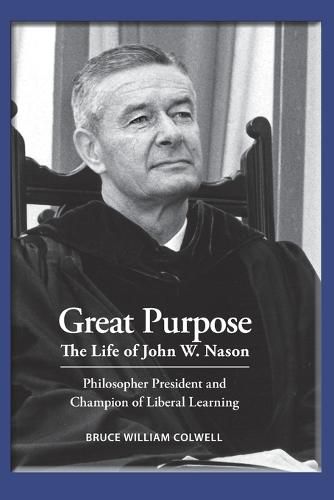Readings Newsletter
Become a Readings Member to make your shopping experience even easier.
Sign in or sign up for free!
You’re not far away from qualifying for FREE standard shipping within Australia
You’ve qualified for FREE standard shipping within Australia
The cart is loading…






This title is printed to order. This book may have been self-published. If so, we cannot guarantee the quality of the content. In the main most books will have gone through the editing process however some may not. We therefore suggest that you be aware of this before ordering this book. If in doubt check either the author or publisher’s details as we are unable to accept any returns unless they are faulty. Please contact us if you have any questions.
"The great purpose of a life," said philosopher William James, "is to spend it on something that will outlast it." By that standard, as well as many others, John William Nason (1905-2001) succeeded beyond measure.
Great Purpose chronicles-in compelling narrative and 275 images-the life of a preeminent 20th century American educator and rationalist philosopher, a fierce champion of liberal learning and of that distinctly American institution, the small residential liberal arts college.
Named president of Swarthmore College at age 35, Nason guided it through the adversities of World War II. While serving as president of the Foreign Policy Association, he helped provide hundreds of thousands of Americans with an accurate, objective understanding of world affairs during the Cold War. And the curricular changes, commitment to diversity, and governance reforms he implemented while president of Carleton College in the tumultuous 1960s not only positioned it to become one of the nation's leading liberal arts colleges, but have continued to serve it well for more than five decades.
This biography will be of interest and value not only to those who care about the histories of Carleton College and Swarthmore College but to those concerned with the history of higher education-especially of liberal arts colleges-during the momentous period of institutional change that began with World War II and extended through the Vietnam War era.
$9.00 standard shipping within Australia
FREE standard shipping within Australia for orders over $100.00
Express & International shipping calculated at checkout
This title is printed to order. This book may have been self-published. If so, we cannot guarantee the quality of the content. In the main most books will have gone through the editing process however some may not. We therefore suggest that you be aware of this before ordering this book. If in doubt check either the author or publisher’s details as we are unable to accept any returns unless they are faulty. Please contact us if you have any questions.
"The great purpose of a life," said philosopher William James, "is to spend it on something that will outlast it." By that standard, as well as many others, John William Nason (1905-2001) succeeded beyond measure.
Great Purpose chronicles-in compelling narrative and 275 images-the life of a preeminent 20th century American educator and rationalist philosopher, a fierce champion of liberal learning and of that distinctly American institution, the small residential liberal arts college.
Named president of Swarthmore College at age 35, Nason guided it through the adversities of World War II. While serving as president of the Foreign Policy Association, he helped provide hundreds of thousands of Americans with an accurate, objective understanding of world affairs during the Cold War. And the curricular changes, commitment to diversity, and governance reforms he implemented while president of Carleton College in the tumultuous 1960s not only positioned it to become one of the nation's leading liberal arts colleges, but have continued to serve it well for more than five decades.
This biography will be of interest and value not only to those who care about the histories of Carleton College and Swarthmore College but to those concerned with the history of higher education-especially of liberal arts colleges-during the momentous period of institutional change that began with World War II and extended through the Vietnam War era.